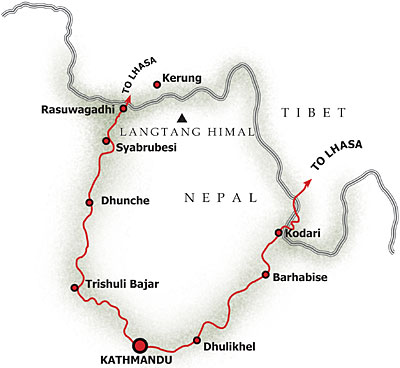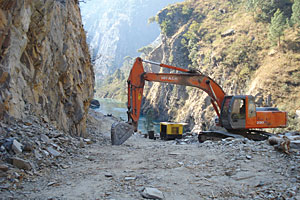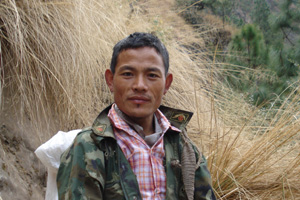 |
Nepal-Tibet border. The mountains here are some of the most remote and inaccessible in the world. But deep in the valleys next to the green, flowing waters of the Kyirong River, Chinese construction workers are blasting through the jagged landscape to turn an ancient trading track into a modern road.
This small stretch of road - just 17km long - from the border to the Nepali town of Syabrubesi is costing the Beijing government almost $20 million. But it's an important investment because this mountain pass not only connects Tibet to Nepal, it's also the most direct land route to India's capital, Delhi.
 JOANNA JOLLY |
"There is an old Chinese saying, 'To get rich, build roads first'," says the Chinese team's engineer Zhang Peng. "When this road is ready, living standards and the economy around here will improve," he says. "Nepali people will be able to visit Lhasa, in Tibet, and other parts of China, and Chinese tourists and businessmen will come here."
The road will make a huge difference to communities on both sides of the border. Traders still walk the old path that runs alongside the new road - an ancient thoroughfare across the roof of the world that connects Nepal to the historic Silk route.
Thirty-five-year-old Mingma Dorje Ghale has walked this small, rocky path since he was a child. He and his friend have just trekked back from Tibet, a day's walk away, carrying bottles of Chinese brandy on their backs. They plan to sell their goods in Nepal's border towns.
"When this road is built, I won't have to carry this heavy backpack up and down," he says. His friend's five-year-old daughter leads their yak. Until now, yaks and mules have been the only way to transport heavy goods across the border and children often take the job of leading them.
 JOANNA ROLLY Mingma Dorje Ghale thinks the road will make life for the next generation easier. |
Mingma hopes that the new road will mean he can drive in and out of China and that his children will be spared the journey, so they can stay at home and attend school. "Life for the next generation will be easier," he says.
Squeezed between the growing economies of China and India, the Nepali government welcomes this sort of infrastructure project that it hopes will bring wealth to an impoverished nation.
The government is also keen to maintain a good relationship with its giant neighbour to the north. Nepal is home to a sizeable Tibetan community, many descended from refugees who've been fleeing Chinese rule since Beijing occupied Tibet 60 years ago.
China is worried that opening up the border could enflame an already unstable Tibetan plateau. Prime Minister Madhav Kumar Nepal says he has reassured Beijing that his government will not allow Tibetan dissidents to operate in his country. "China has only one concern, that is the concern of Tibet," he says. "That is why our policy towards China has been consistent. We believe in the One China policy, Tibet is an integral part of China and the soil of Nepal will not be allowed to be used against Tibet and China."
For those living in this remote border region, this policy is not a problem.
 JOANNA ROLLY Phurpu Tsering Tamang says the local community's access to Chinese wealth is more important than politics. |
"After the Chinese occupied Tibet, some people told us the Chinese are very rude and very tricky," he says. "But what I see when I visit Tibet is that they are building roads everywhere and they're building houses for the people, so they have an easier life."
Nepal will need to continue to reassure China even after this road due to open in two weeks, is completed. It's hoping to attract more Chinese investment - and eventually create a trans-Asian highway that will cut through the Himalaya, linking China to India and opening up Nepal further.
Joanna Jolly is the BBC's Kathmandu correspondent. For more BBC coverage of South Asia go to http://news.bbc.co.uk/2/hi/south_asia


